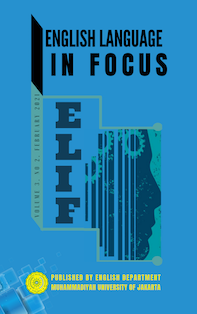ESP Needs-Based Course Design for the Employees of Government Protocol Department
DOI:
https://doi.org/10.24853/elif.3.2.143-158Keywords:
ESP, Needs-Analysis, Course designAbstract
Needs analysis plays an important role in the context of designing the ESP course. Hutchinson and Waters (1989) classify needs into two main categories: learning and target. Learning needs refer to what the student needs to do to learn; target needs include necessities, wants, and lacks. To collect data for those two fundamental aspects of needs, various forms of analysis were used, i.e Target Situation Analysis (TSA), Present Situation Analysis (PSA), Learning Strategy Analysis (LSA), deficiency analysis, and Means Analysis (MA). This article represents the process of designing an ESP course design for the employees of the Protocol Department in the Palembang City Mayor Office, which focuses on the needs analysis gathered through questionnaires, interviews, and observations. The data were analyzed both quantitatively and qualitatively. The results of the needs analysis were used to provide employees with a course design. The proposed course is designated as English for Professional Purposes: Basic level of conversation.References
Belkbir, R. (2019). Investigating the Impact of English for Specific Purposes (ESP) Curriculum on Moroccan Graduates’ Career. International Journal of Language and Literary Studies, 1(1), 64–71. https://doi.org/10.36892/ijlls.v1i1.26
Black, P., & Wiliam, D. (1998). Assessment and Classroom Learning. International Journal of Phytoremediation, 21(1), 7–74. https://doi.org/10.1080/0969595980050102
Chan, C. S. C. (2018). Proposing and Illustrating a Research-Informed Approach to Curriculum Development for Specific Topics in Business English. English for Specific Purposes, 52, 27–46. https://doi.org/10.1016/j.esp.2018.07.001
Chovancová, B. (2014). Needs Analysis and ESP Course Design: Self-Perception of Language Needs Among Pre-Service Students. Studies in Logic, Grammar and Rhetoric, 38(51), 43–57. https://doi.org/10.2478/slgr-2014-0031
Crystal, D. (2003). English as a Global Language (2nd ed.). New York: Cambridge University Press.
Dudley-Evans, T., & John, M. J. S. (1998). Developments in English for Specific Purposes: A Multi-Disciplinary Approach (1st ed.). Cambridge University Press.
Genc, Z. S. (2013). EFL in higher education: Designing a Flexible Content-Based Curriculum at University-Level. Asian EFL Journal, 13(1), 85–113.
Hutchinson, T., & Waters, A. (1989). English for Specific Purposes : a Learning-Centred Approach. Cambridge University Press.
Lazaro, D. C., & Medalla, E. M. (2004). English as the Language of Trade, Finance and Technology in APEC: An East Asia Perspective. https://pidswebs.pids.gov/
Li, J. (2014). Literature Review of the Classifications of “Needs” in Needs Analysis Theory. International Journal of Education & Literacy Studies, 2(3), 12–16. https://doi.org/10.7575/aiac.ijels.v.2n.3p.12
Lin, J., Wang, A., & Zhang, C. (2014). Integrating Curriculum Design Theory into ESP Course Construction: Aviation English for Aircraft Engineering. Open Journal of Modern Linguistics, 04(02), 219–227. https://doi.org/10.4236/ojml.2014.42017
Petraki, E., & Khat, K. (2020). Challenges and Constraints in the Design of an ESP Course in Cambodia: Implications for Higher Education Institutions. Asia Pacific Journal of Education. https://doi.org/10.1080/02188791.2020.1798738
Petrus, I. (2012). English language teaching in higher education: An English course design at a state university (Doctoral Dissertation) [Universitas Pendidikan Indonesia]. http://repository.upi.edu/7887/
Petrus, I. (2014). ESP Syllabus: Compromising Needs and Wants in Higher Education. The 61 TEFLIN International Conference. https://eprints.uns.ac.id/26262/1/29._ESP_Syllabus_Compromising_Needs_and_Wants_in_Higher_Education.pdf
Robinson, P. C. (1991). ESP Today : a Practitioner’s Guide. New York: Prentice Hall.
West, R. (1997). Needs analysis: a State of the Art. In R. Howard & G. Brownz (Eds.), Teacher Education for Languages for Specific Purposes (pp. 68–79). Clevedon: Multilingual Matter.
West, Richard. (1994). Needs Analysis in language Teaching. Language Teaching, 27(1), 1–19. https://doi.org/10.1017/S0261444800007527
Downloads
Published
Issue
Section
License
Authors who publish with this journal agree to the following terms:
- Authors retain copyright and grant the journal right of first publication with the work simultaneously licensed under a Creative Commons Attribution License that allows others to share the work with an acknowledgment of the work's authorship and initial publication in this journal.
- Authors can enter into separate, additional contractual arrangements for the non-exclusive distribution of the journal's published version of the work (e.g., post it to an institutional repository or publish it in a book), with an acknowledgment of its initial publication in this journal.
- Authors are permitted and encouraged to post their work online (e.g., in institutional repositories or on their website) before and during the submission process, as it can lead to productive exchanges, as well as earlier and greater citation of published work (See The Effect of Open Access).


